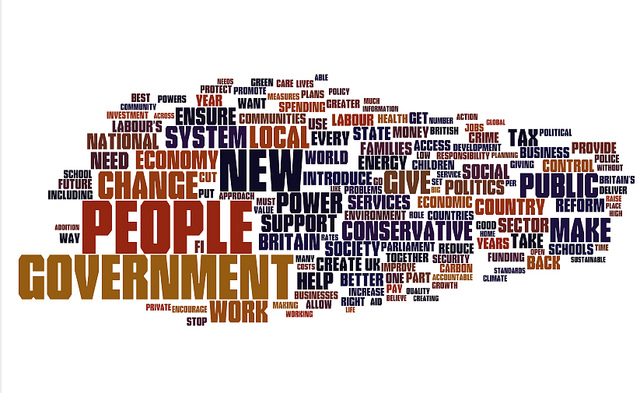Analysing party manifestos shows the extent of ethnic minority marginalisation in the UK’s electoral politics
A recent analysis of party manifestos carried out by Paul Chaney and summarised here shows that the amount of attention paid to ethnic minorities has increased in both national and devolved programmes for government. However, he also observes that despite the progress that has been made, the main parties have failed to fully adapt their policy-making to meet the needs of an increasingly ethnically-diverse population.
A quarter of a century ago, analysis concluded that ‘non-white access to the political agenda in Britain remains minimal and problematic’. Today Islamophobia, immigration and increasing social diversity mean that issues of ‘race’ equality is a key political issue. However, a recent study suggested that little has changed over the past 25 years, for there remains, ‘worrying evidence that second-generation citizens of Black Caribbean heritage do not feel that the British political system has treated them fairly… A just and well-functioning democracy requires that all citizens have fair access to the political arena’.
My paper in Parliamentary Affairs seeks to set out to engage with this debate by focusing on the attention given to the substantive representation of ethnic minorities in the political parties’ manifestos for UK general elections 1964-2010, and post-1998/9 elections in Scotland, Wales and Northern Ireland. “Substantive representation” here is a term concerned with one of the fundamental tenets of democratic theory; that parliamentarians should act in the interest of the represented, in a manner responsive to them. In the present case, it means ensuring ethnic minorities’ needs and concerns are reflected in public policy and law.
In the paper I argue that analysis of party manifestos is appropriate to exploring issues of ‘race’ equality in UK politics not only because it tells us about the ‘health’ of our democracy but also because it reveals political intent and parties’ vision for a multi-ethnic society. In addition to being a social justice issue this is also a matter of legal compliance and whether manifestos (which, after all, are parties’ future programmes for government) are consistent with instruments such as the European Commission’s Racial Equality Directive (2000/43/EC), the UN Convention on the Elimination of All Forms of Racial Discrimination, UN General Assembly resolution 2106, and the Equality Act (2010) all of which require government to uphold ‘race’ equality.
The study used two straightforward measures to analyse manifesto attention to the substantive representation of ethnic minorities – “issue salience” (effectively content analysis of manifestos involving quantitative analysis of the number of pledges concerned with ethnic minorities) and “policy framing” (examination of the language used in proposals – exploring themes and topics).
First, what did the analysis tell us about the three main parties’ manifestos in Westminster elections since 1964? Over the past five decades the substantive representation of ethnic minorities has been subject to increasing attention – or issue-salience. This has involved party politicking and the dismissal of rivals’ programmes and approaches. 16.3 per cent of the post-1964 total was made in the 1970s, 18 per cent in the 1980s, and 21.9 per cent in the 1990s. However, the most pronounced increase is evident after 2000 with 38.1 per cent of the total made over the past three elections. Over the period 1964-74 the substantive representation of ethnic minorities had a narrow ‘issue profile’ (in other words, policy proposals were confined to certain policy frames rather than normalised or ‘mainstreamed’ across all frames and policy areas). In contrast, it is in the years 1979-2010 that there is a broadening of the policy frames related to proposals on SREM in party programmes.
Public policy on migrants and refugees remains the principal frame in the manifestos (accounting for just under a third, 31 per cent, of all post-1979 proposals); it is a frame that initially gained significant attention in the 1964 election (e.g. ‘Labour accepts that the number of immigrants entering the United Kingdom must be limited’). It was the subject of a mean of six proposals per election to October 1974. Subsequently, the mean increased to 16 per election. Underlining key differences between parties in the way that manifesto proposals are framed, it is the Conservative party that has advanced the most proposals on this topic. During the period 1979-2010 policy for ethnic minorities is increasingly articulated in terms of tackling racial discrimination and promoting ‘race’ equality.
This stemmed from growing realisation on the Left in the early 1980s that existing public policy initiatives were undermined by the relative weakness of administrative and political action in support of legal methods of implementation. In addition, the reality was that parties’ attention to this issue was also driven by potential rewards of issue voting. Thus, 40 per cent of manifesto proposals on tackling racial discrimination and promoting ‘race’ equality were made by Labour and 33 per cent by the Liberals/ Liberal Democrats. Reflecting the Party’s traditional opposition to regulatory intervention just over a quarter (27 per cent) was made by the Conservatives.
Content analysis of party manifestos for the first ‘devolved’ elections in 1998-99 reveals modest levels of attention to policy for ethnic minorities. All but three parties set out specific policy proposals. Yet there was an evident failure to advance proposals across all policy frames. Amongst the nation-wide parties the Liberal Democrats presented most proposals. However, underlining the potential of devolution to shape patterns and processes of interest representation, it was the ‘regionalist’ parties (Plaid Cymru, SNP etc.) that advanced the greatest share of proposals on policies for ethnic minorities in each election. Overall, comparison of the 1998/9 and 2011 elections also reveals a twofold increase in issue-salience in the party programmes.
What is the significance of the study findings? They show that over recent years there has been a pronounced rise in the salience of ethnic minority representation in parties’ state-wide and ‘devolved’ election programmes. In the case of Westminster elections the mean number of frames per election has more than doubled over the past half-century. Data on the ‘devolved’ elections underline that the new political spaces created by devolution are also affording opportunities to advance the substantive representation of marginalised social groups in multi-level politics.
Notwithstanding these gains, the study also reveals significant shortcomings. For example, whilst the EC refers to an ‘increasing governmental commitment to mainstreaming and tackling multiple forms of discrimination across Europe’, the election programmes analysed in the paper provide limited evidence of mainstreaming. Moreover, all-too-often party programmes are reductive – in other words they refer to ethnic minorities as an homogeneous category instead of a group characterised by multiple identities (marked by gender, disability, age and so on).
The election data also confirm territorial policy divergence in relation to the substantive representation of ethnic minorities. This is driven by parties advancing distinctive proposals in different polities, as well as state-wide parties holding contrasting issue-positions across territories. Overall this study underlines parties’ failure to adapt the formative phase of their policy-making to meet the needs of an increasingly ethnically-diverse population. As noted, it also has potential legal compliance implications for it shows parties to be standing for election on policy platforms that sometimes fall short of statutory ‘race’ equality requirements.
Note: this post represents the views of the author and not of Democratic Audit or the LSE. Please read our comments policy before posting. The shortened URL for this post is: https://buff.ly/H7CxqZ
 Paul Chaney is Reader in Public Policy at Cardiff University. His books include Women, Politics and Constitutional Change (2007, Cardiff, University of Wales Press, co-authoredand Equality and Public Policy (2011, Cardiff, University of Wales Press,) he is currently working on a research project at the Wales Governance Centre exploring public policy-making and devolved governance.
Paul Chaney is Reader in Public Policy at Cardiff University. His books include Women, Politics and Constitutional Change (2007, Cardiff, University of Wales Press, co-authoredand Equality and Public Policy (2011, Cardiff, University of Wales Press,) he is currently working on a research project at the Wales Governance Centre exploring public policy-making and devolved governance.






 Democratic Audit's core funding is provided by the Joseph Rowntree Charitable Trust. Additional funding is provided by the London School of Economics.
Democratic Audit's core funding is provided by the Joseph Rowntree Charitable Trust. Additional funding is provided by the London School of Economics.